I’ll Take You There tells the story of a young woman growing up in America during the 60s: going to university, falling in love, coming to terms with her relationship to her parents. At university she joins a sorority; in the sorority house the girls are busy becoming women together, discovering themselves and other people, becoming “sisters”. The narrator does not join in the fun. She becomes confirmed in her self-opinion as an irredeemable outsider, appalled by the predatory “heifer-sized” males, their faces “covered in smeared lipstick as if they’d been devouring raw meat”, and the girls, “exuding ‘personality’ like a lighthouse beacon flashing light”. She spends her time reading Kant, Spinoza, and Democritus, desperate for company and consolation.
She never reveals her proper name, but calls herself “Anellia”, or as one character puts it, “Annul-ia” – “She who is not”. She attempts to construct a personality for herself, but her attempts to get to know the truth about herself and others lead to disaster and she comes to believe that self-knowledge is an impossibility: “We never see ourselves, at all; we have no clear idea of ourselves; our mirror reflections reflect only what we wish to see, or can bear to see, or punish ourselves by seeing.”
First she leaves the sorority, after a pointless act of martyrdom which the other women revile, and then she falls in love with Vernor Matheius, a black graduate philosophy student with a face “crinkled and even mutilated by thinking”. Vernor is very probably a genius, but he has only two kinds of mood: “the Inspired and the Shitty”. He has cut himself off from other people, and from the burgeoning civil rights movement – “his home was in the mind”. She seeks to follow Vernor’s example, but this doesn’t work either, and after discovering uncomfortable truths about him, she is left once again to her own devices. In the end she saves herself through writing, but not before she’s faced the final truth about her own feckless father, who she had assumed was dead, and who is now in fact dying of cancer and seeking understanding.
The book is a creepily accurate portrait of Oates’s stock-in-trade, the sensitive young adult. Anyone who left their Christmas party early, disgusted by their own timidity and drunkenness, suffering perhaps from love’s “delirious lassitude of fever”, and who resolved over the new year to give up smoking, make a new start, maybe go travelling and live life to the full, will identify with the torments of Oates’s woman with no name. “This was my curse. I would bear it through my life. As if a wicked troll had baptized me, in infancy… unknowing; a flick of the troll’s fingers, poisonous water splashed on to my forehead. I baptize thee in the name of ceaseless yearning, ceaseless seeking and ceaseless dissatisfaction. Amen!” Sound familiar?
( Courtesy of The Guardian, 290 pages )

